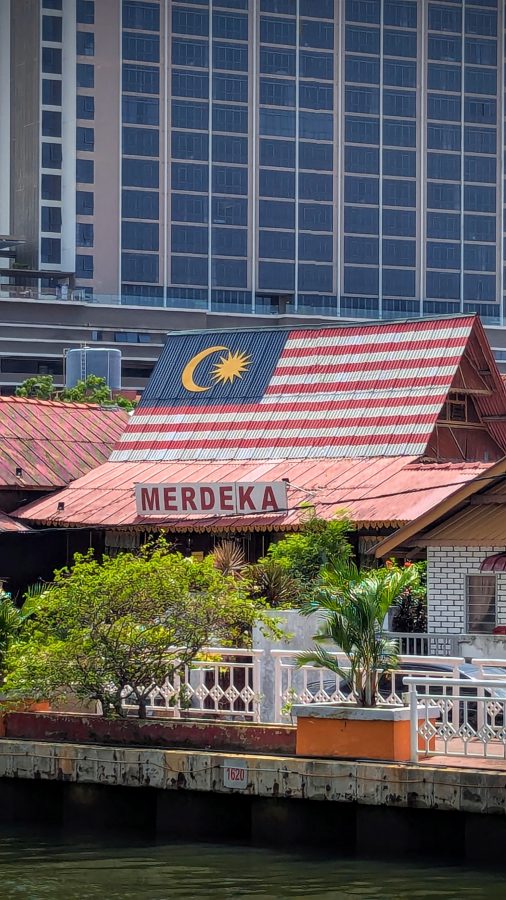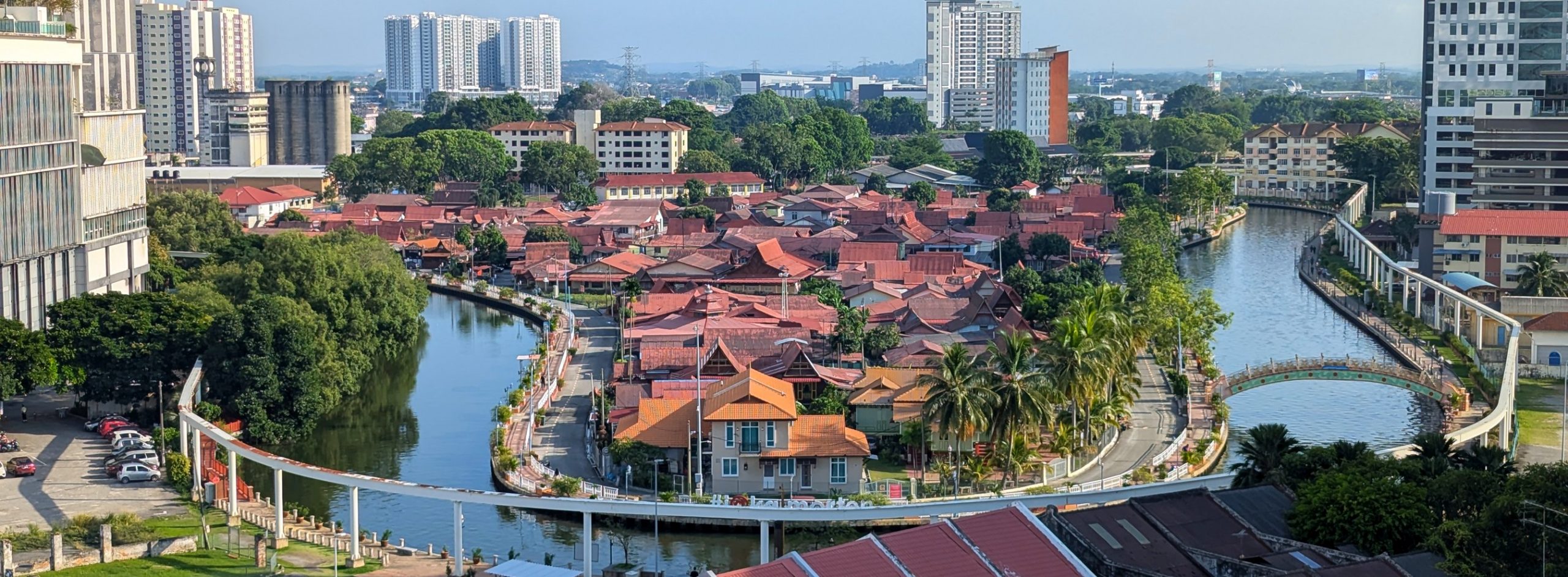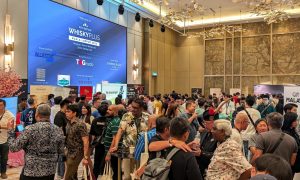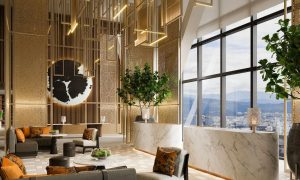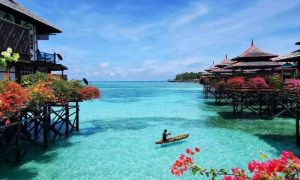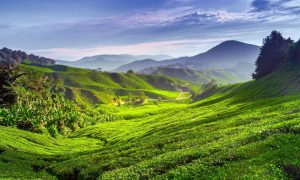Located near the new Dusit Princess hotel and tucked inside the modern heart of Melaka, Kampung Morten offers visitors a rare chance to witness a traditional Malay village that’s still very much alive, with its residents preserving customs, crafts, and architecture amid an ever-changing cityscape.
It’s not often you come across a place where heritage is not only preserved but lived every day. Kampung Morten, located in the heart of Melaka, is one of those rare places – a traditional Malay village quietly holding its ground as the city around it evolves into a modern tourist magnet. We recently discovered the charms of this almost-hidden pocket of the city on a recent trip to Melaka.
Named after British land commissioner Frederick Joseph Morten, the village was founded in 1920 with the help of a $10,000 government loan. It was carved out of what was then a mangrove swamp, intended as a new settlement for displaced Malay communities. In an unusual show of colonial gratitude, the village was named after Morten himself – a name it retains to this day.
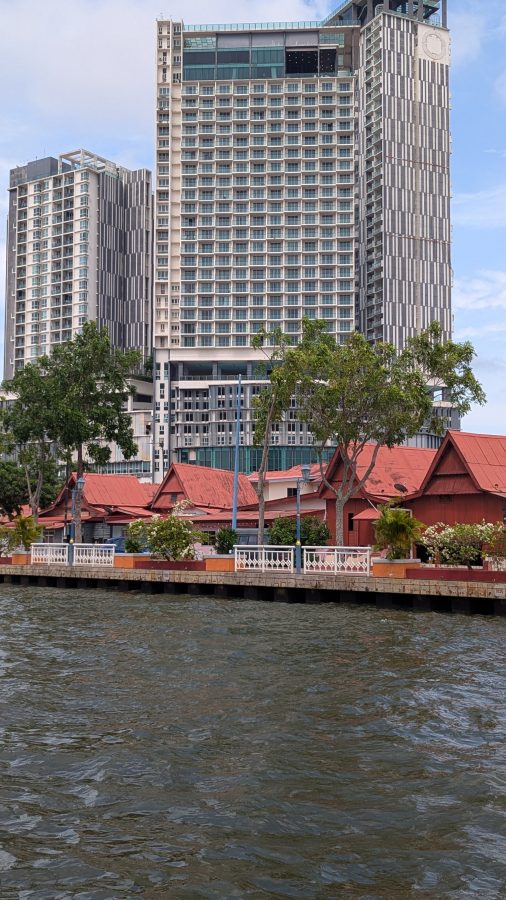
A LIVING HERITAGE
Today, Kampung Morten is gazetted as a heritage village under the Malacca Preservation and Conservation Enactment, and it’s easy to see why. Home to around 85 traditional Malay houses, the village is a walkable open-air museum – but one that’s still very much lived in. Residents continue their daily routines here, often inviting curious travellers to witness or even participate in cultural demonstrations, from weaving pandan mats to putting on small gamelan performances.
The architecture is one of the key attractions. Built mostly from wood, bamboo, and even some nipah thatch, many of the houses follow the traditional Malay design of being slightly raised on stilts, allowing for better air circulation and cooling. They feature wide verandas, pitched roofs, and are sometimes brightly painted in pastel shades with hand-carved embellishments. Many houses still follow the traditional system of post-and-beam construction without the use of nails, allowing them to be dismantled and moved in times of flooding – a clever feature from an earlier era that speaks volumes about local ingenuity. As we walked through the riverside village, we saw a number of residents going about their late morning routines, the quiet air of the neighbourhood only occasionally broken by the cawing of crows.

Perhaps the best-known property in Kampung Morten is Villa Sentosa, built by Haji Hashim Abdul Ghani in the 1920s and still run by his descendants today. The house doubles as a living museum and is open to the public daily (except for shortened hours on Fridays). Inside, visitors are shown a treasure trove of Malay memorabilia – wedding costumes, musical instruments, antique household tools, and family heirlooms – all explained in earnest by the home’s caretakers. The villa celebrated its 100-year anniversary in 2024.
Another local personality of note is Baser Ali, a craftsman who builds intricate miniature models of Malay houses by hand. His work can sometimes be seen on display during heritage walks or community-led tours. These tours, usually offered on Mondays, Wednesdays, and Fridays, are a worthwhile way to get a more in-depth look at Kampung Morten’s stories, traditions, and architectural features. Or, like we did, it’s easy enough to simply take the walk on your own, though you’ll miss out on the personal guide aspect!
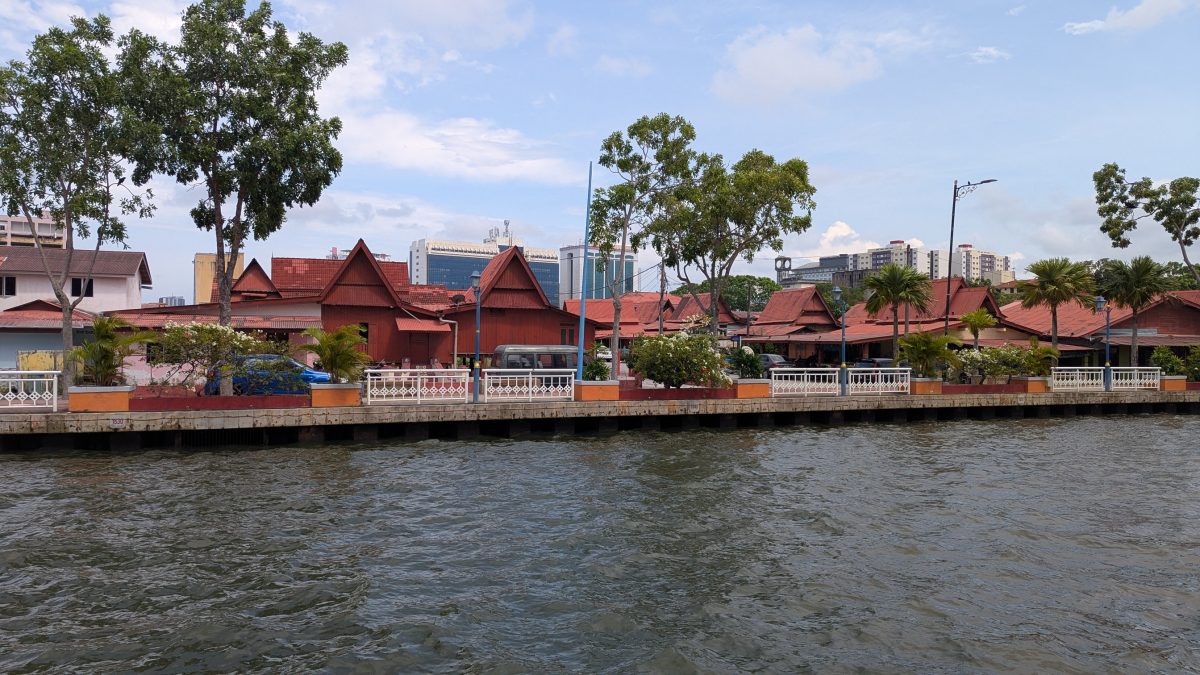
A RIVER RUNS THROUGH IT
The village is fronted by the winding Melaka River, a once-important trade route that’s now better known for leisurely cruises and evening strolls.
Historically, though, the Melaka River was once dubbed the “Venice of the East” by 16th-century Portuguese traders, as it served as a vital trade artery connecting Melaka’s inland areas to the bustling port. Spices, silks, and ceramics were all transported along this waterway, helping establish Melaka as a key hub in the maritime spice trade.
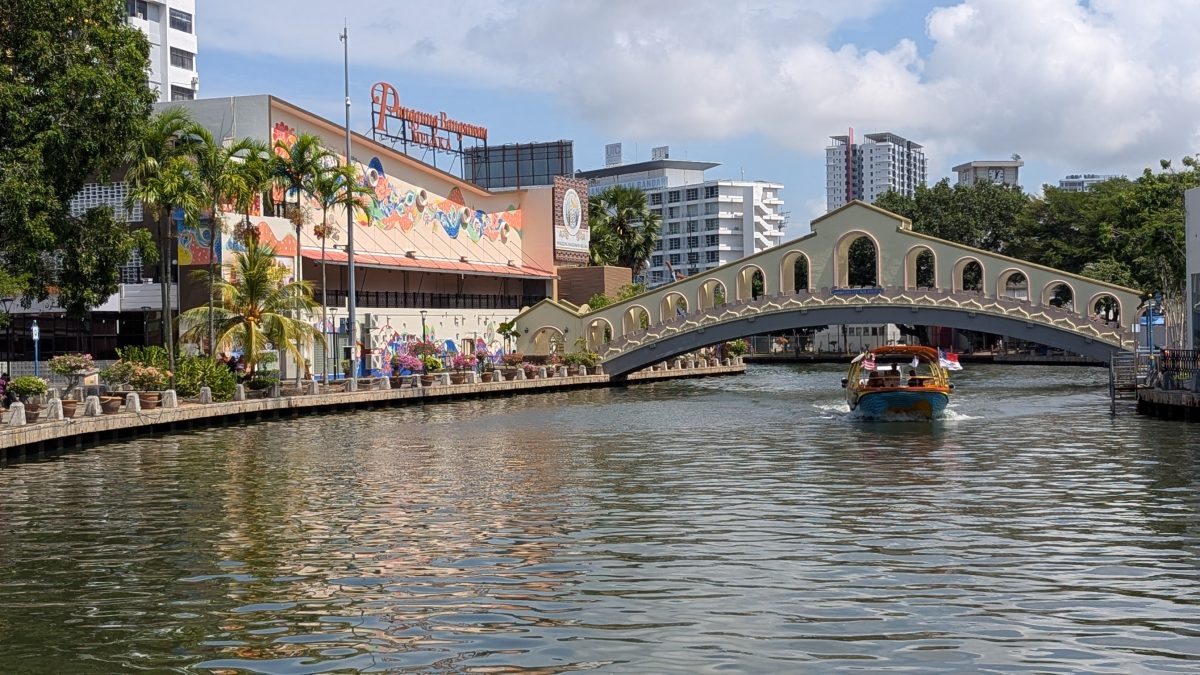
More recently, the river has been extensively beautified and revitalized. It winds through the heart of the city, flanked by heritage buildings, colourful murals, cafés, and boutique stays. The stretch through Kampung Morten offers a particularly photogenic view, as the traditional Malay houses are beautifully juxtaposed with the modern cityscape that lies just beyond.
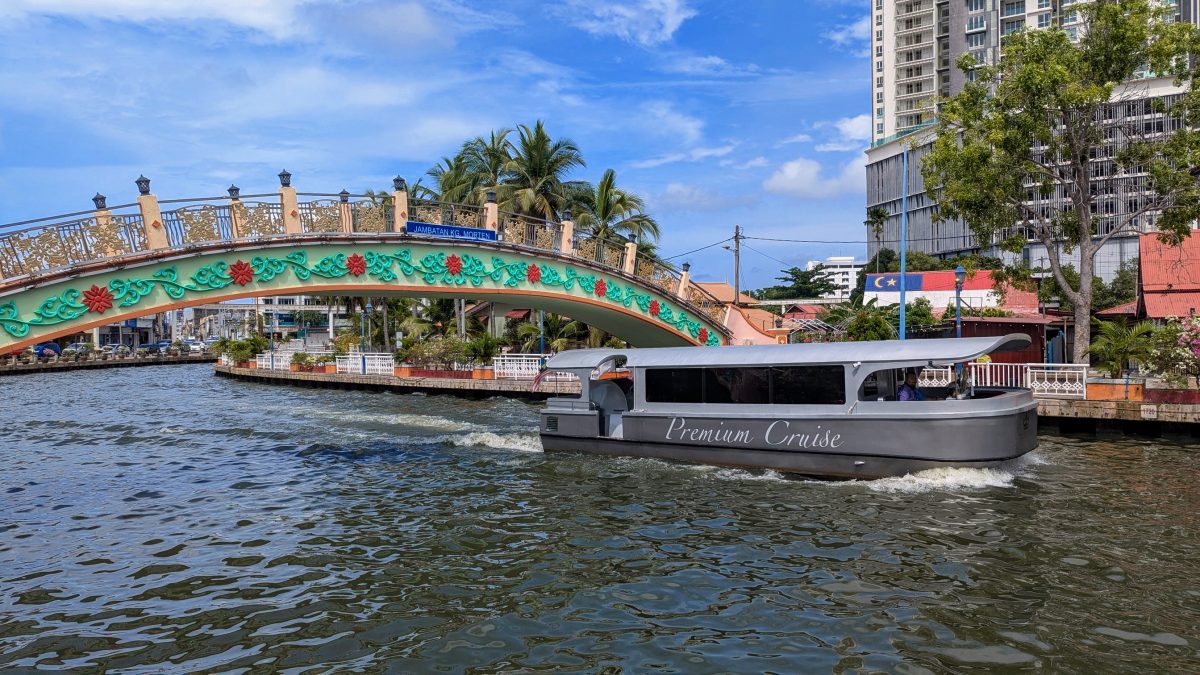
Boats still pass by regularly, offering their passengers glimpses of Kampung Morten that contrast sharply with the notably more tourist-heavy stretches downstream. Here, the view is quieter and more authentically lived-in – traditional houses, clotheslines, and the occasional resident tending to potted plants by the water’s edge.
The riverside path is a pleasant place to walk, certainly in the cooler morning hours, but also especially around sunset, when the village lights come on and the animated chatter from visiting neighbours carries across the river. Indeed, late afternoon or early evening is said to be a particularly great time to visit, as many residents return from work and the village comes alive with conversations, cooking, and impromptu neighbourhood gatherings. Our own leisurely visit took place in the midmorning, and we found it one of the standout delights of the trip.
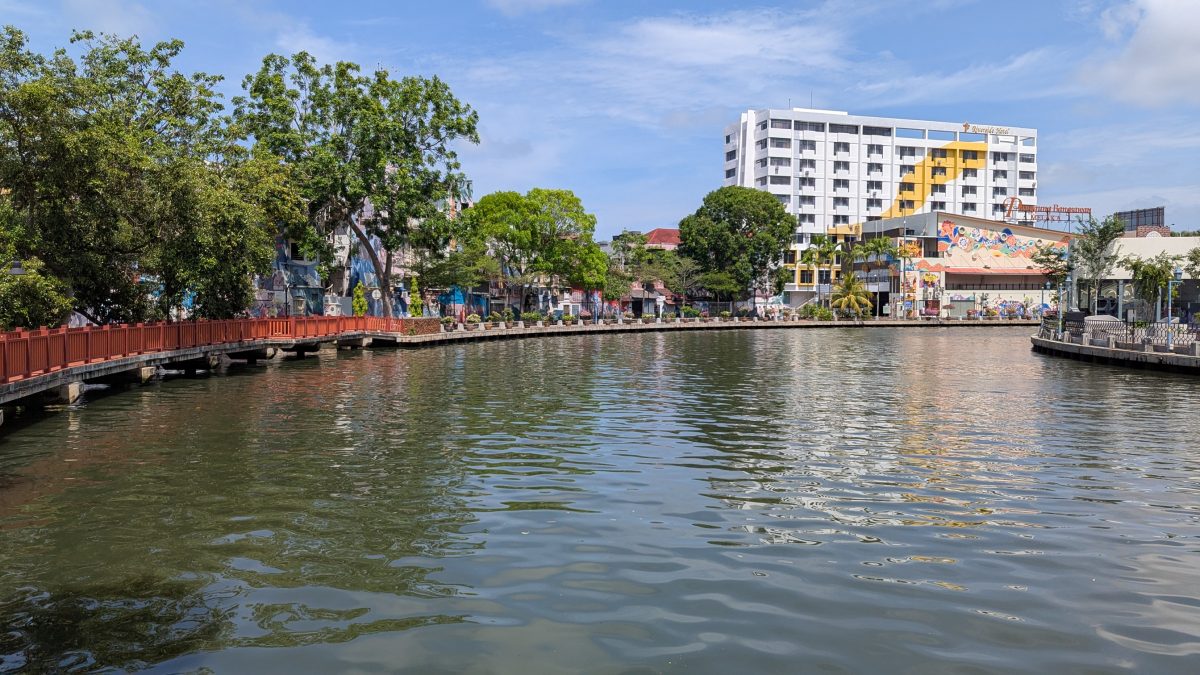
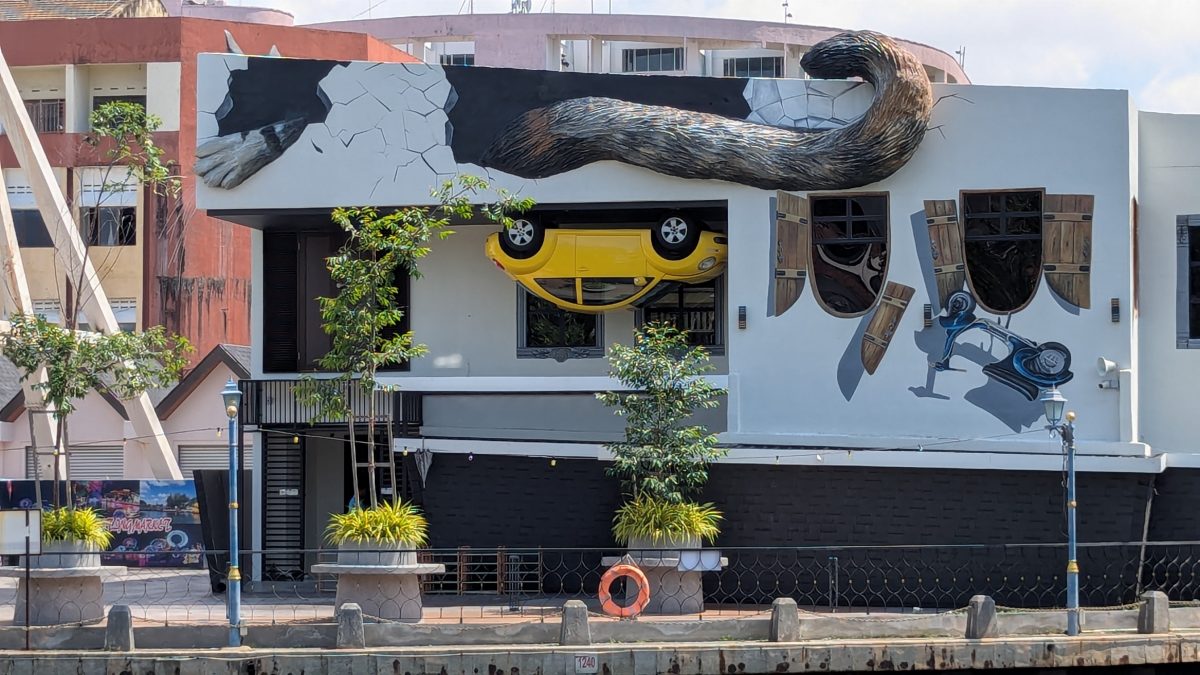
Despite being almost surrounded by the river that snakes around it, Kampung Morten’s location actually makes it easily accessible (that, and the scene-stealing Morten Bridge). And though it seems to be in a world all its own, in fact the village is just a short walk from Melaka’s well-known historic centre. It’s also visible from river cruises, with its colourful homes offering a stark contrast to the neon lights, soaring modern buildings, and even some mild urban sprawl that surround it.
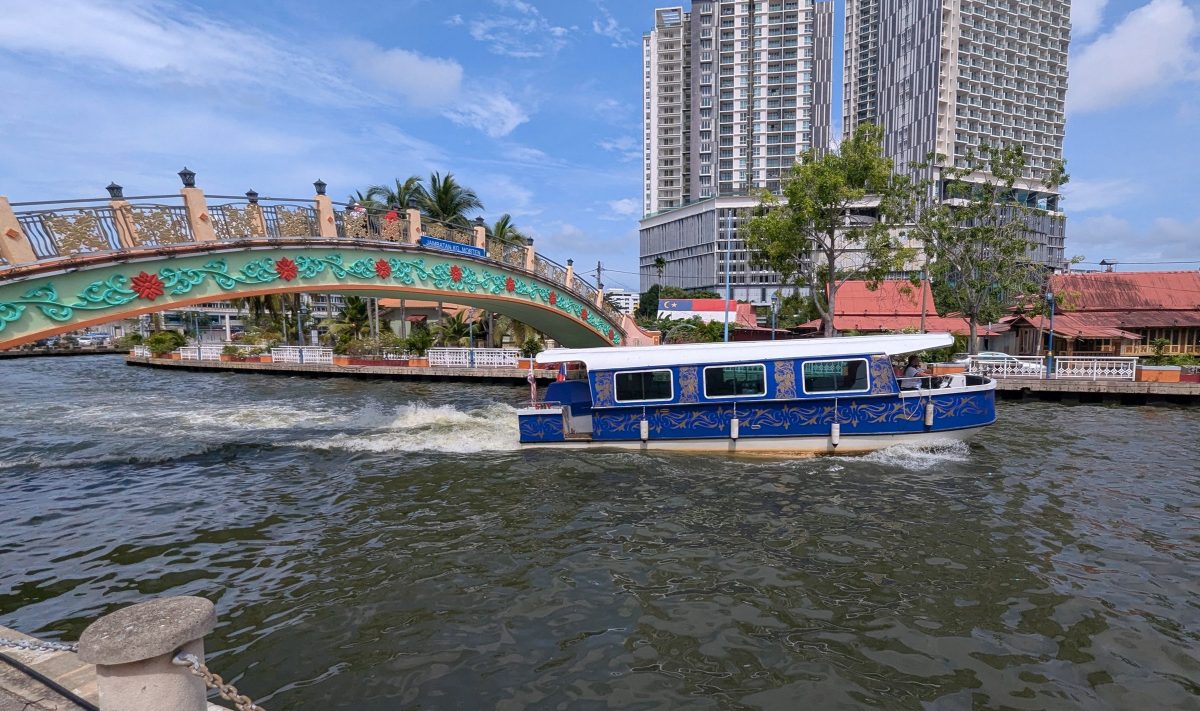
A CURIOUS TRACK TO NOWHERE
Anyone looking at the village or wandering along the river can’t help but notice the abandoned tracks of Melaka’s once-ambitious monorail, as well. Now something of a cautionary tale in overzealous urban development, the RM16.5 million monorail was opened to great fanfare in October 2010 as part of a broader effort to modernize the city and complement the riverside upgrading efforts, aiming to provide a scenic and convenient transport option along the Melaka River.
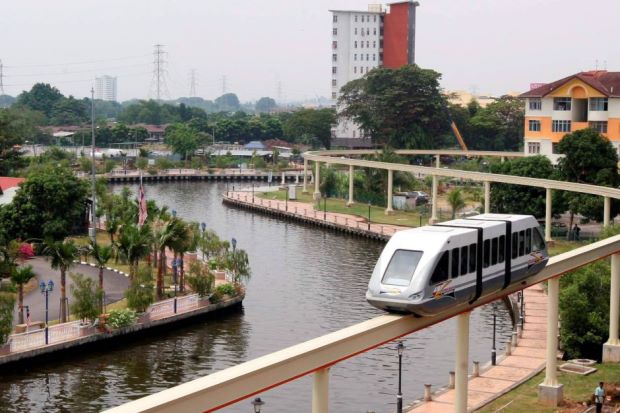
However, problems surfaced almost immediately, with technical failures plaguing the system from day one. Indeed, on its very first day of operation, the monorail broke down, stranding 20 passengers mid-ride. Certainly not a good omen, and the problems didn’t stop there. Mechanical and design issues continued, and service was frequently disrupted or suspended, understandably leading to a lack of confidence in the system.
Moreover, the track covered only about 1.6 km between Taman Rempah and Kampung Bunga Raya Pantai, making it more of a tourism novelty than a practical or useful transport solution.

Despite occasional attempts to revive it following its initial cessation of operations in 2013, Melaka’s monorail never really gained traction and has been more or less abandoned since it shut down for good. The operator’s contract was formally cancelled in 2021. The infrastructure is still there today, however – you’ll see the tracks running along the river near Kampung Morten and even through part of the heritage zone. The failed project has undeniably become something of a white elephant, and a rather visible one at that, as it runs through some of the most visited parts of the city, no doubt prompting curious glances and questions from tourists.
The Melaka monorail stands as a symbol of perhaps overly grandiose plans that weren’t matched by practical execution – a reminder that not all riverfront enhancements have aged as gracefully as Kampung Morten.
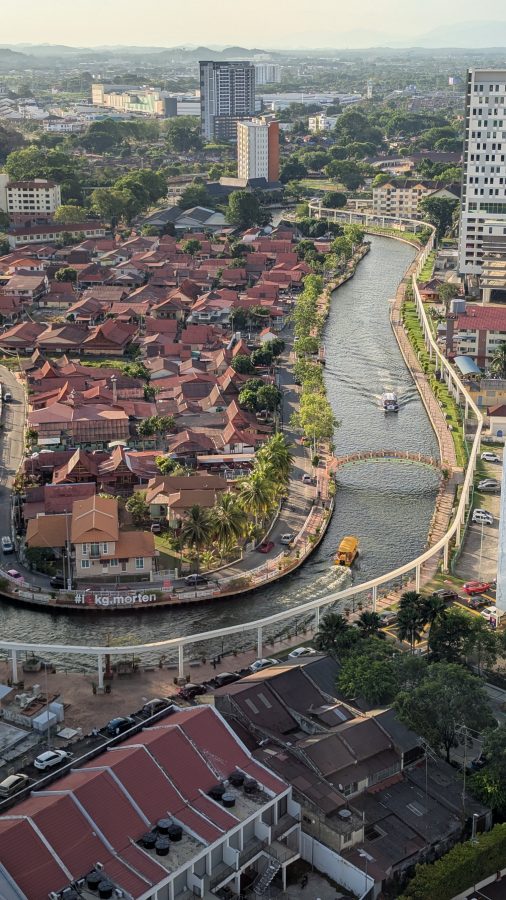
STAY AND PLAY
We were in town to visit the newly opened Dusit Princess hotel, just nearby. The hotel marks the first entry of the expansive Thai hospitality brand in Malaysia, and our first impressions here were very favourable. The 296-room property was previously operated as a Ramada hotel, and while it’s still under the same ownership now, the extensive refurbishment and rebranding really brings the Dusit hotel into its own.
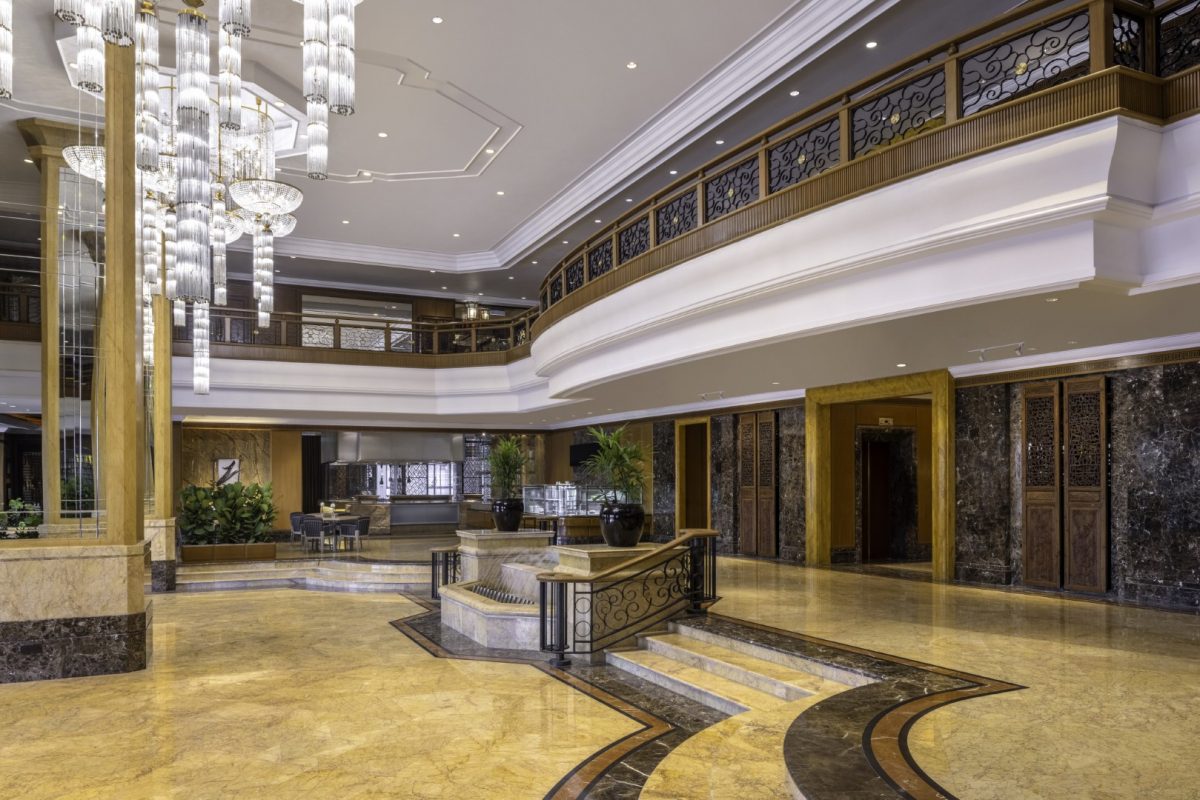
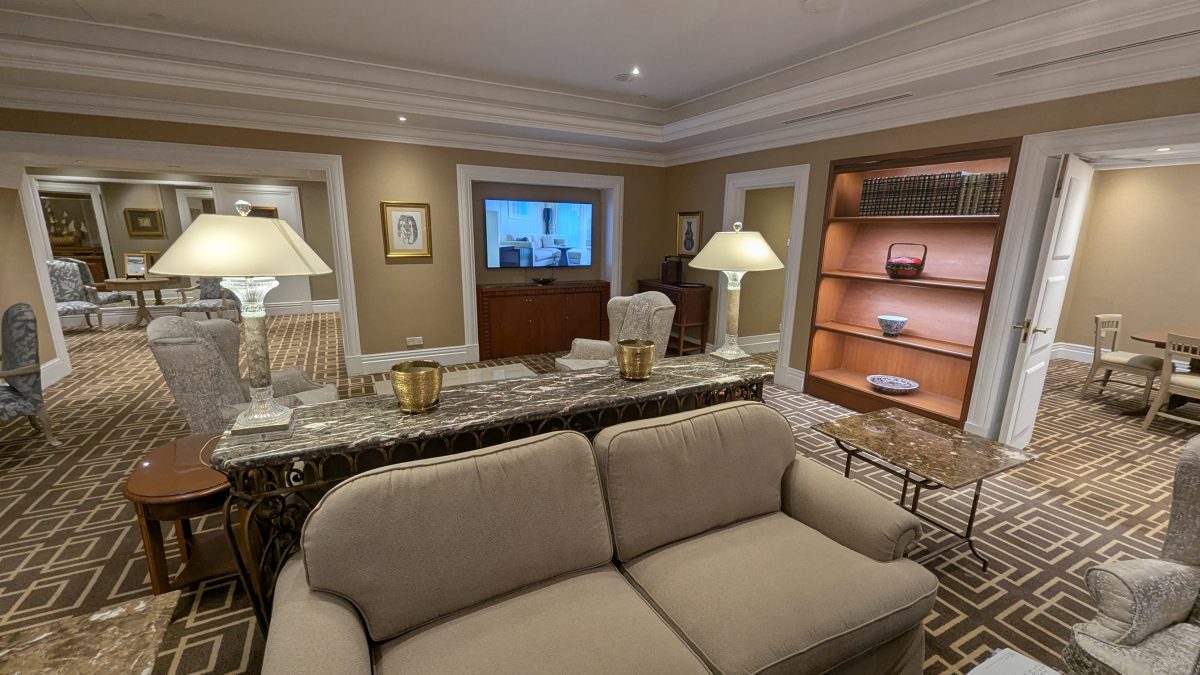
The staff are keen to blend Thailand’s legendary hospitality with Melaka’s rich heritage, so don’t be surprised to get the occasional “Sawasdee ka” greeting here! The hotel is already making a name for itself in Melaka’s hospitality market, too, with attractive rates, excellent service, and a long list of upscale offerings, including spacious rooms, onsite restaurants, a well-appointed gym, a welcoming lobby lounge and bar, a lovely club lounge, and what is surely one of the best hotel pools to be found in Malaysia.
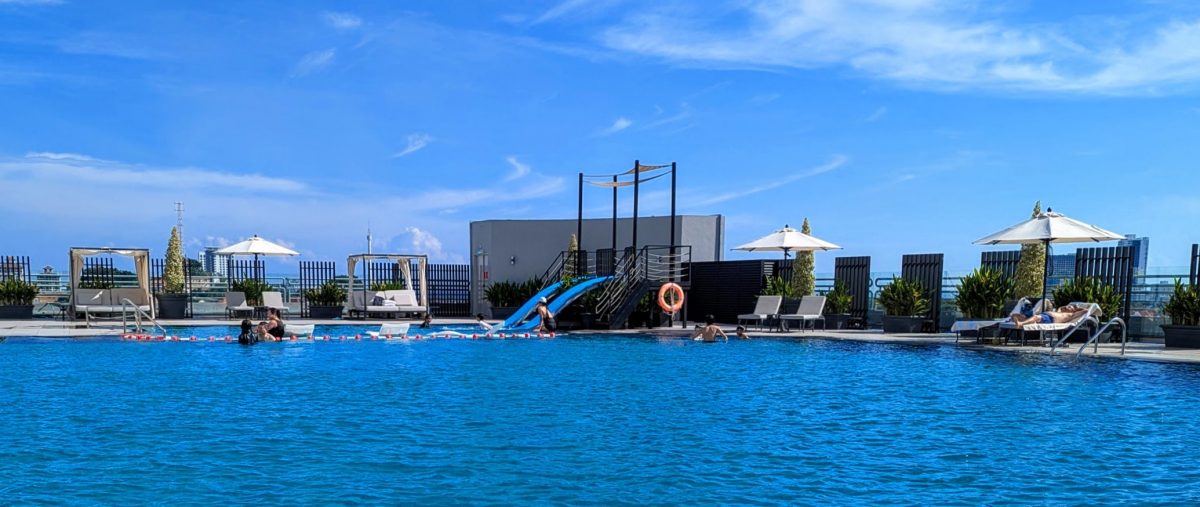
The large swimming pool, located on level 9, stands out for a number of reasons. First, the elevated views in all directions are superb, offering guests a sweeping vantage point of the cityscape as they relax poolside. Curtained, cabana-style daybeds, wide sunloungers, and plentiful greenery and topiary give a “lazy tropics meet the elegant Mediterranean” vibe! Partially submerged loungers are available in the pool’s shallowest end, while a pair of waterslides offer kids (and the occasional adult) plenty of fun.
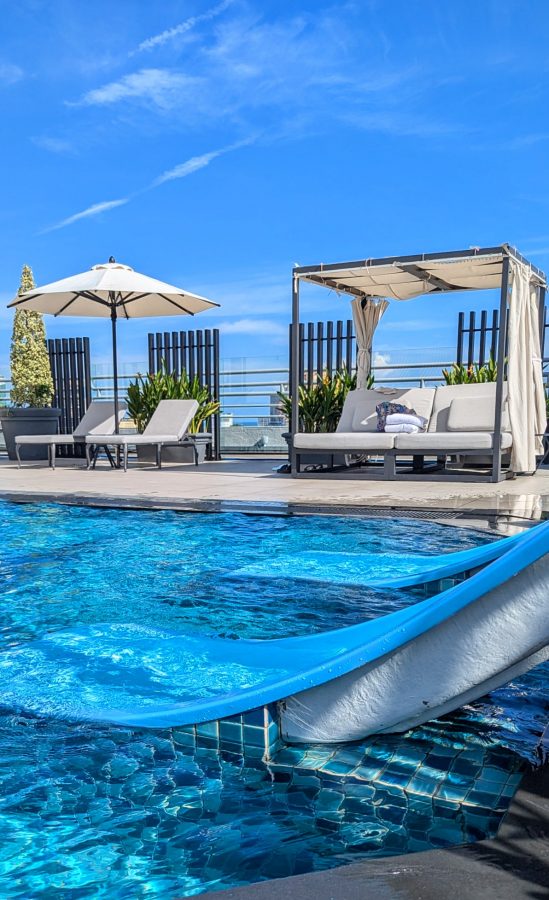
But the most surprising thing about this pool – beyond its sheer size – is its depth! In a world that seems to eschew any swimming pool deeper than 1.5 m, Dusit offers guests a chance to not just wade, but truly swim. The pool gradually deepens as you move from one side to the other, eventually reaching a depth of 2.7 m. We couldn’t remember the last time we saw a pool in a hotel (or even a condo for that matter) that’s nearly nine feet deep!
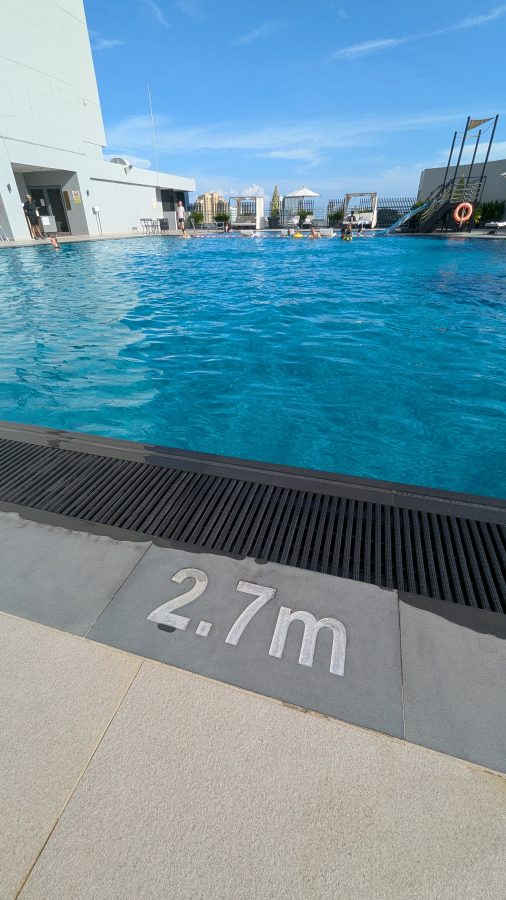
As for neighbourhood wandering, not only is Kampung Morten immediately nearby, so is the classic Majestic Hotel, and you need not be a guest to nip in to its old-school colonial-style lobby and enjoy a classic gin and tonic at the beautiful bar. (Our advice? Go from 5 to 7 pm and take advantage of their excellent buy-one-free-one happy hours.) A number of popular food stalls and hawker centres are also within a one- or two-block stroll if you’re craving some of Melaka’s local delicacies.
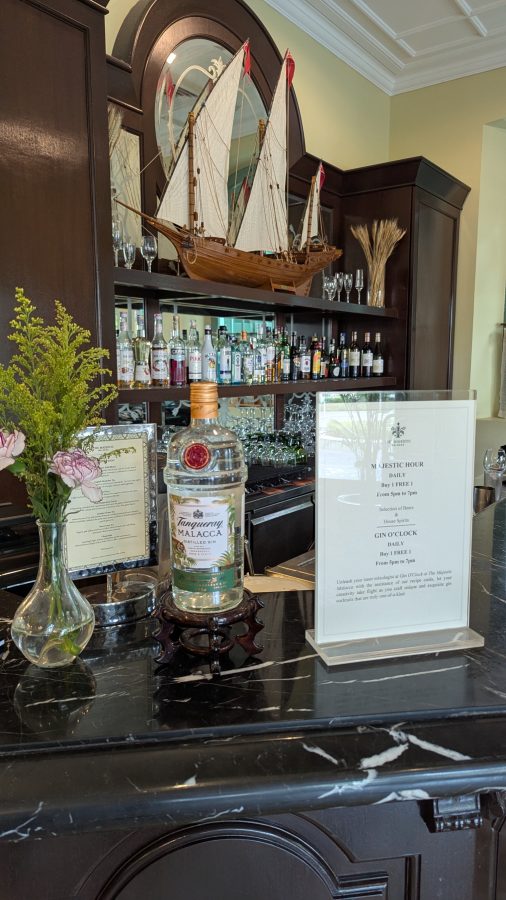
If you’d rather stay on-site and soak up some classy ambiance in Dusit’s lobby lounge, called Famosa, they have some happy hour specials worth mentioning. Our favourite was a bucket of five ice-cold beers – choose from Carlsberg, Sapporo, and Kronenbourg 1664 – for just RM100 nett. We loved this offer, and would love to see more hotels adopt similar pricing to encourage their guests to stay put rather than wander out for less exorbitantly priced refreshments!
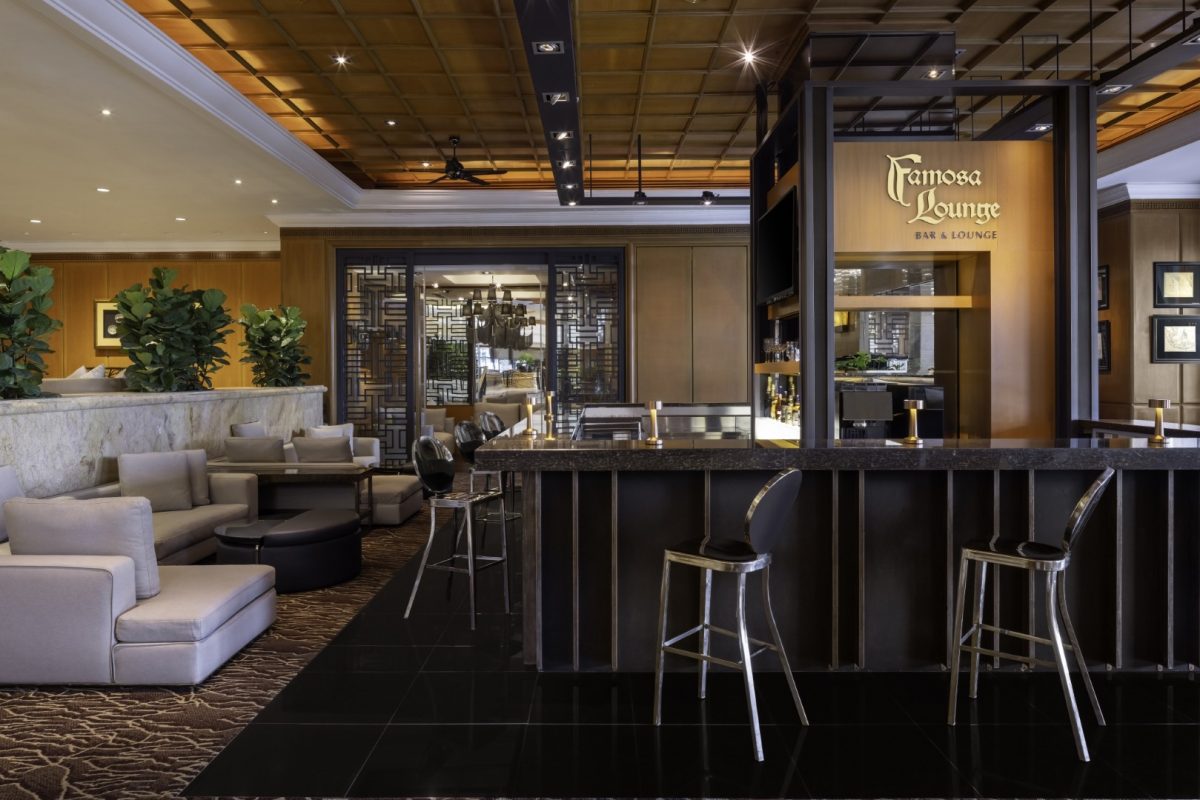
Rooms at the Dusit Princess are smartly decorated and appointed, most offering eye-catching views of either the city or the Straits of Malacca, depending of course on which side you’re located. Ours boasted a separate bathtub and walk-in shower, a spacious writing desk, a large lounge/daybed, and the accoutrements expected in any upscale hotel, such as a fridge with minibar, coffee and tea-making facilities, Nespresso pod coffee machine, comfy robes, and a safe.
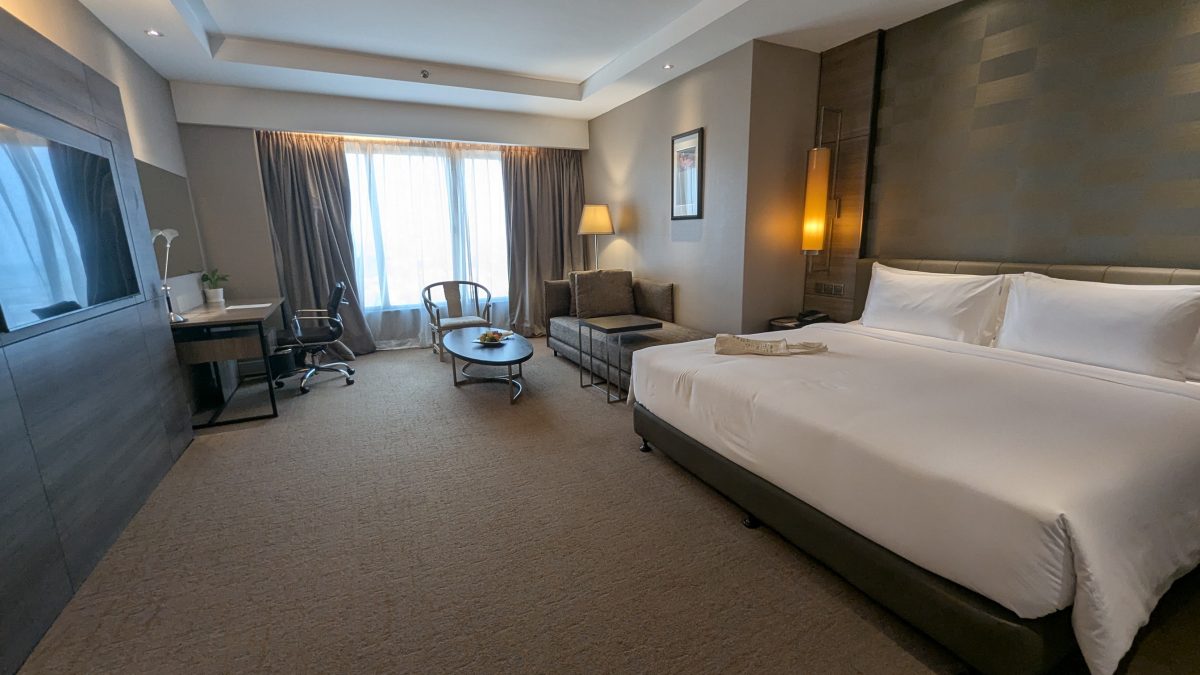
The hotel offers a number of guest activities and experiences both in the hotel itself and at nearby partners, ranging from batik canting lessons and Peranakan fashion photoshoots to museum tours, river boat rides, and even onsite latte art classes and junior ‘master chef’ activities for the kids. We tried the latte art experience, and while it was fun and informative, it’s safe to say we gained a much deeper appreciation for the time and practice baristas must put in to perfect the craft of creating attractive patterns with the foam on their coffee drinks. Ours were terrible – and could only be considered ‘art’ in the most extreme abstract interpretation of the word!
But surely the fondest memory of our stay at the Dusit Princess was that impromptu morning walk which, over a leisurely hour and a half, took us along the winding river, by the api-api mangrove forest (Avicennia marina) – which was replete with numerous massive water monitors – and over the colourful Morten Bridge and among the dozens of old Malay kampung houses with their characteristic Melakan style. That such an enlightening experience could be found such a short stroll away from the hotel made it all the more enjoyable.

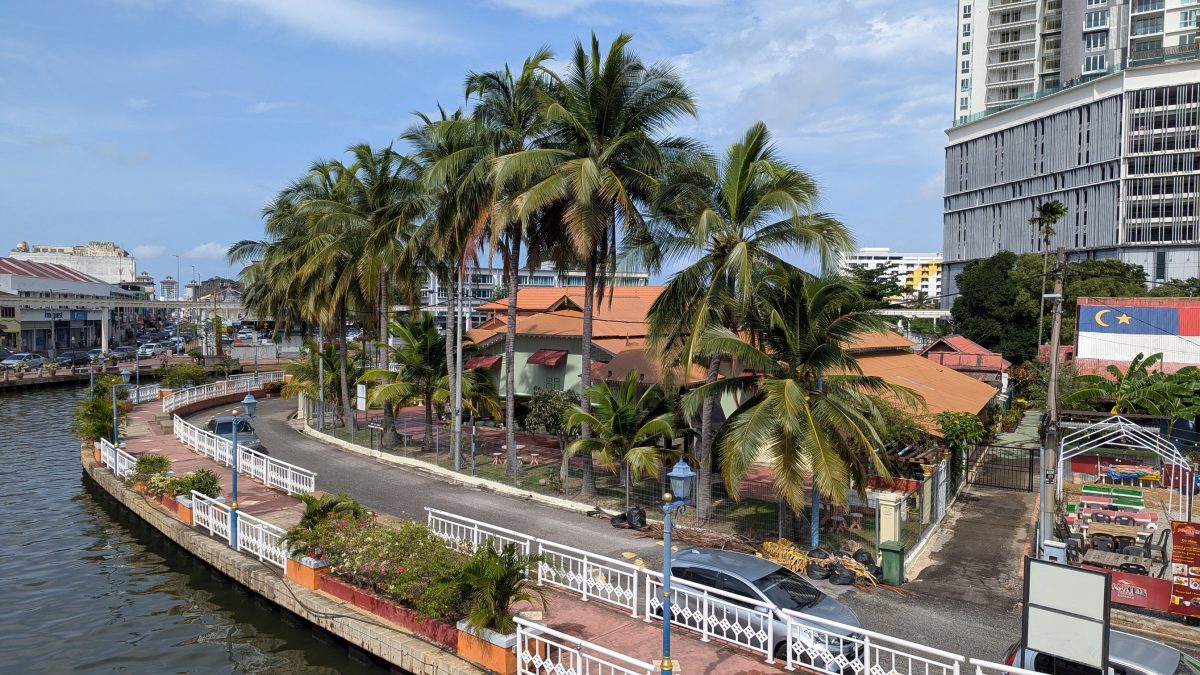
Kampung Morten stands as perhaps one of the last remaining Malay kampungs within a Malaysian city centre, offering a genuine, unfiltered window into the past. It’s not a performance, nor is it a museum-like set piece, frozen in time. It’s real heritage that still lives and breathes – and that’s what makes it special.
